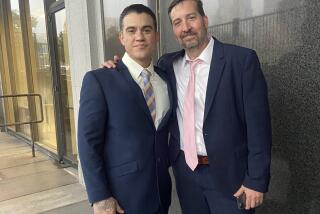Inmate was innocent in fatal arson case, judge rules
- Share via
A federal judge has ruled that a Modesto man convicted of setting a fire that killed his tenant and her two children has shown “actual innocence” and may now challenge his conviction on other grounds.
Chief U.S. District Judge Anthony W. Ishii upheld the findings of a magistrate who examined the evidence against George Souliotes, 72, and concluded that no reasonable juror would have convicted him given the state of the evidence today.
But the court’s finding will not necessarily free Souliotes, convicted of setting a 1997 fire in a rental home he owned.
His lawyers missed a legal filing deadline, and under the law, Souliotes had to prove his innocence before he could appeal his conviction on other grounds, including inadequate legal representation at trial.
In determining actual innocence, the judge considered both old and new evidence, regardless of its admissibility at trial. His decision was based on whether he believed it was “more likely than not” that a reasonable juror with that information would have found the inmate guilty beyond a reasonable doubt.
Ishii said in his ruling that the appeal should now proceed quickly. Citing Souliotes’ age, Ishii said the innocence determination “only heightens” the urgency required.
Fire scientists have discredited evidence that was used to convict Souliotes, and the state has conceded that it no longer can prove that the deadly 1997 blaze was deliberately set. Souliotes has been behind bars for 15 years.
Aleka Pantazis, 64, Souliotes’ sister, said attorneys will meet early next week to schedule a hearing.
“My heart is so happy, and I am so touched,” said the Glendale resident, who helped persuade the Northern California Innocence Project to represent Souliotes. “I can finally hope.”
California Atty. Gen. Kamala D. Harris has fought to uphold the conviction that sent the Greek immigrant to prison for life. Lawyers for her office tried to overturn the innocence finding on the grounds that Souliotes has not proved exoneration. But Ishii said the law does not require exonerating evidence in such cases.
Michelle Jones, 31, and her children, Daniel Jones Jr., 8, and Amanda, 3, perished in the fire.
Modesto fire investigators determined that the blaze was deliberately set, based on a variety of factors that are now known to occur in accidental fires. Prosecutors also presented evidence that a petroleum substance found on Souliotes’ shoes matched a compound that ignited the fire and called it “the most conclusive scientific evidence of his guilt.”
“The shoes tell the tale,” a prosecutor told the jury in closing arguments.
But a fire scientist later determined that the substance on the shoes was chemically different from the fire debris, a finding that prosecutors did not dispute.
Prosecutors also presented an eyewitness at trial who testified that she saw Souliotes approach the house in the darkness just before flames erupted. But defense lawyers reenacted the scene and presented the magistrate with a video that showed she could not have seen what she claimed.
That and other evidence led the magistrate who conducted the innocence hearing to conclude that the witness was not credible.
More to Read
Sign up for Essential California
The most important California stories and recommendations in your inbox every morning.
You may occasionally receive promotional content from the Los Angeles Times.














